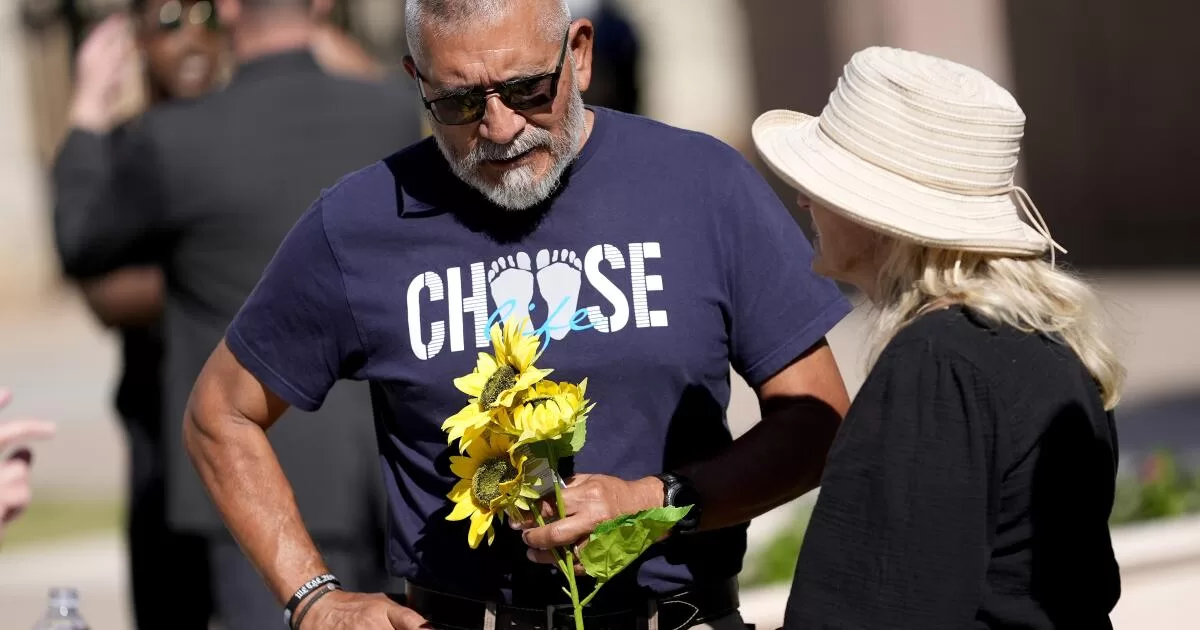Although no vote was taken on the repeal itself, Republican Sens. T.J. Shope and Shawnna Bolick sided with 14 Democrats in the Senate in changing rules to let a repeal proposal advance after the deadline for hearing bills had passed. Proponents say the Senate could vote on the repeal as early as May 1.
If the repeal wins final approval from the Republican-controlled Legislature and is signed into law by Democratic Gov. Katie Hobbs, the 2022 statute banning the procedure after 15 weeks of pregnancy would become the prevailing abortion law.
The move by the Senate came after Republicans in the House, for the second time in a week, blocked attempts on Wednesday to bring a repeal bill to a vote. One Republican joined 29 Democrats in the House to bring the repeal measure to a vote, but the effort failed twice on 30-30 votes.
The state’s near-total ban, which predates Arizona’s statehood, permits abortions only for saving the woman’s life and provides no exceptions for rape or incest. It carries a sentence of two to five years in prison for doctors or anyone else who assists in an abortion.
Last week, the Arizona Supreme Court drastically altered the legal landscape for terminating pregnancies in the state, concluding the 1864 law can be enforced and suggesting doctors can be prosecuted under the statute.
The debate in the House over whether to allow a vote on the repeal proposal was much fierier than in the Senate. Members from groups opposed to abortion rights packed the House’s gallery and gave a standing ovation after efforts to bring the repeal bill to a vote was defeated.
House Speaker Ben Toma said those wanting to repeal the law were demanding action too soon, noting the court decision to revive the law came only a week ago. He said the only way he would bring the repeal bill to a vote would be if his fellow Republicans wanted it.
“We have deeply held beliefs,” Toma said. “And I would ask everyone in this chamber to respect the fact that someone wants to believe that abortion is in fact the murder of children.”
Democratic Rep. Alma Hernandez of Tucson said Republicans are failing to act on a matter of great importance to Arizonans.
“This is what we are arguing about right now: whether or not we should overturn something that is archaic, something that is going to really impact women in Arizona,” Hernandez said. “And yet we want to talk about a process or the right process.”
Rep. Matt Gress, the Phoenix Republican who joined with Democrats in trying to bring the repeal measure to a vote, said the 160-year-old law doesn’t reflect the values of most people living in the state.
“We need to get that taken care of and get it taken care of as soon as possible,” Gress said. “I think the eyes of the nation are on Arizona.”
In a statement, Hobbs, who supports a repeal of the law, said: “Republican extremists in the House have yet again failed to do the right thing. In just one week living under this new reality, women, doctors, and healthcare providers have already begun to feel the devastating effects of living under a total abortion ban. We cannot go on like this.”
Get the L.A. Times Politics newsletter
Deeply reported insights into legislation, politics and policy from Sacramento, Washington and beyond. In your inbox three times per week.
You may occasionally receive promotional content from the Los Angeles Times.
The Center for Arizona Policy, a longtime backer of antiabortion proposals before the Legislature, released a statement saying: “Today was a victory for life, even if only temporarily. Most pro-life lawmakers kept their promise today to protect the unborn and their mothers and not repeal Arizona’s pre-Roe law.”
The Civil War-era law had been blocked since the U.S. Supreme Court’s 1973 Roe vs. Wade decision guaranteed the constitutional right to an abortion nationwide.
After Roe vs. Wade was overturned in June 2022, then-Arizona Atty. Gen. Mark Brnovich, a Republican, persuaded a state judge to lift an injunction that blocked enforcement of the 1864 ban. Brnovich’s Democratic successor, Atty. Gen. Kris Mayes, urged the state’s high court to hold the line against it.
The state’s highest court said enforcement of the 1864 law won’t begin for at least two weeks. However, it could be up to two months, based on an agreement reached in a related case in Arizona.
Billeaud writes for the Associated Press. AP writer Scott Sonner in Reno contributed to this report.
